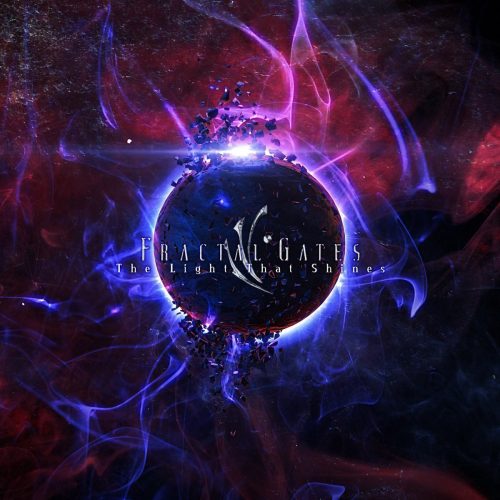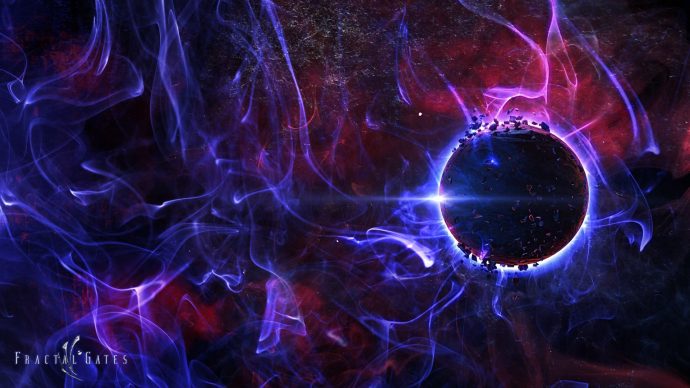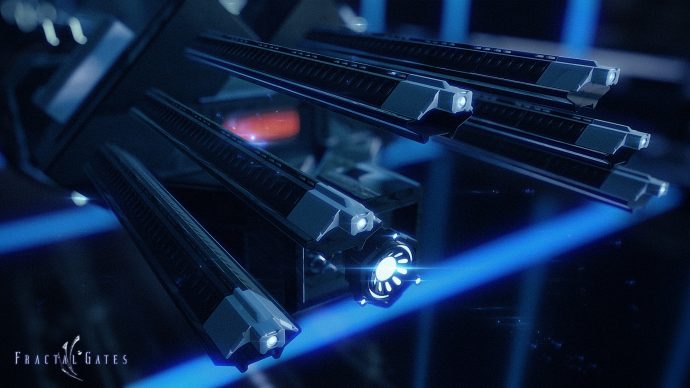(This is DGR’s review of the new album by Fractal Gates, which was released on May 12th through Naturmacht Productions.)
Five years between discs is on the long end of the “should I just stop checking to see if this band is doing anything or move on” segment of the waiting scale for fans. It actually may be the darkest part of said scale, where you wind up quickly moving through the five stages of grief about letting a group go, yet being thankful at the same time for all the music you do enjoy from them while clinging to the hope that if something new does pop up in the future it will serve as a pleasant surprise. It’s an odd yet freeing type of emotional whiplash, and one that many fans of France’s prog keyboard-heavy melodeath crew of Fractal Gates had likely started going through as the time passed since the release of the group’s 2013 album, Beyond The Self.
The musicians in Fractal Gates have certainly kept busy during that time, particularly vocalist Sebastien Pierre, who has become part of a variety of projects including Enshine, his solo work through Cold Insight, his various Mass Effect cover songs and reimaginings, and even some work with Monolithe — but those who enjoyed the up-tempo, keyboard-heavy work of Fractal Gates finally got their own taste of new material this year with the group’s new, densely packed album The Light That Shines, a disc that has absorbed five years worth of experiences into its own introspective formula.
The Light That Shines stays pretty true to the Fractal Gates blueprint from its outset — the cover art continues their pattern of favoring cosmic events, and the band even perpetuate their instrumental “Visions” series of songs that appear between every few regular tracks, bringing that collection of music up to twelve parts by the time The Light That Shines closes out.
Fractal Gates use their cosmic keyboards theme to break the album up into separate movements, with the first three songs of The Light That Shines having the “welcome back” element to them, keeping things high-paced and very catchy. So much so, that it seems like “Chasing The Line” and “Infinity” are two sides of the same coin, both of them manifesting a similar pacing and overall song formula. They feel like they would’ve been twins anywhere else were it not for the different lyrical pacing between them.
“Breath Of Life”, the real opening song after the spaced-out synth of “Visions X” slowly fades out, is a very recognizable opening track as it immediately kicks into high gear, and honestly, the rocking back-and-forth motion of the chorus with the galloping drums behind it and the glorious guitar melody leading the whole fray makes it one of those dangerous show-stopper songs that are often prone to keeping people from listening to the rest of an album for a bit because the temptation to go back to it is just far too great.
The first half of The Light That Shines in particular tends to stay in the pretty up-tempo, keyboard-led mood for its five songs, each one armed with a glorious guitar lead for its chorus segment while Sebastien roars over the top of it. In particular, “Dreams Apart” really hammers that ideal home, and for folks who thought Omnium Gatherum might have whiffed it a bit with Grey Heavens and are okay with the keyboard work being a little bit more “spacey”, the first half of The Light That Shines might lock you in as a listener, especially as “Dreams Apart” seems to just add more and more to itself over the course of its four-some-odd minutes. The final melodic refrain where it slows down and gets a little bit more Euro-doom, moving into one final gallop, is a bombastic way to close out a song before it segues into the ‘80s Sci-Fi soundtrack-esque movements of “Visions XI”. At this point, you wouldn’t be faulted for thinking that The Light That Shines had some cinematic aims among its overall listening goals.
The second half of the album contains the slower (by melodeath standards) and more keyboard, prog-heavy segments of the disc as a whole. Save for “Reborn” — which includes a blast-heavy opening segment — The Light That Shines finds a pretty heavy mid-tempo groove in its second half, and the band do a lot of writing around that, freeing them up to weave different keyboard works and smaller guitar elements around the whole affair. It’s a little less headbang-heavy and a little bit more introspective-sounding, though there’s still a fair bit of guitar rocking and keyboard cheese spread throughout.
“The Light That Shines” (the song) is the likely culprit for what became the blueprint for that second half. It’s a beautiful and slower song, capable of bringing the spaced-out imagery that the band seek to evoke, and you can really sense where the tendrils of that song expanded out into the rest of the disc, particularly post-“Visions XI”. “Reborn” stands out so much simply because it’s the more straightforward and speedy rocker sibling among its more contemplative brethren, especially “Seas Of Flames”, which is a more percussive and cymbal-prominent song in its opening moments and probably the one song where the many Euro-doom side projects that were worked on in between the two Fractal Gates discs start to bleed through. The one small keyboard-focused moment, where the song fades into the back a bit and a lone, cold keyboard melody fades in over the now-much-quieter song, is a very nice touch to break up the hammering rhythm of the track as a whole.
The near six-minutes of “Seas Of Flames” serves as a fantastic closer to The Light That Shines, though, especially as the final guitar leads fade out along with the rest of the band and the song moves into the quieter “Visions XII”.
The nearly forty-five minutes of The Light That Shines has a dreamlike quality to it, especially once you start segueing into the second half of the disc. Fractal Gates don’t overstuff their music, but they definitely get a lot of mileage out of what they do use, and the members of this band clearly have an ear for melody. There are so many hidden melodic lines woven throughout each song that The Light That Shines becomes one of those “constant repeat to find new things” albums. However, simply being a treasure-digging-style album isn’t enough, and this is much more than that. Even at its most shallow and face-value levels, a lot of The Light That Shines is obscenely catchy, capable of worming different guitar and keyboard parts into your brain over and over — especially the twin-song segment early on in the album.
The Light That Shines really sounds like it has had five years of work put into it, slowly forged over multiple sessions, because there’s just too many moments of perfect synchronicity that happen throughout the disc where everything seems to line up exactly as it should for maximum epic sound that it can’t have been happenstance. There’s clearly a lot of melodeath musical expertise being put to work there. The Light That Shines is a dynamic and cinematic piece of keyboard-heavy prog-melodeath that you should not miss.
Bandcamp:
https://fractalgates.bandcamp.com/album/the-light-that-shines
https://naturmachtproductions.bandcamp.com/album/the-light-that-shines
Facebook:
https://www.facebook.com/fractalgates/




This album has some beautiful cosmic melodies. Kinda reminds me of Edge of Sanity’s Crimson albums sometimes.